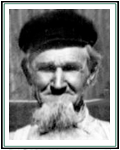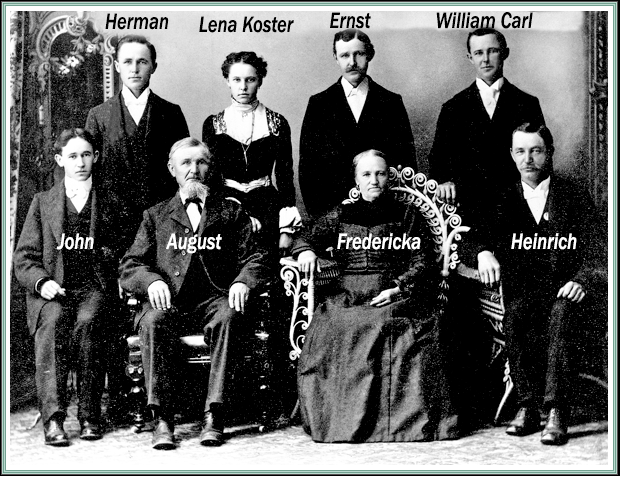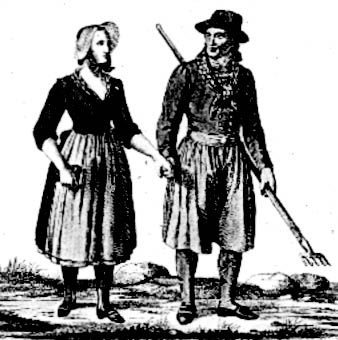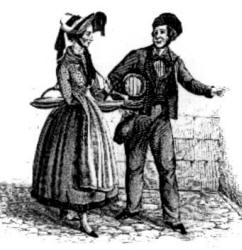|
 |
|
 |
|
|
|
 |
|
 |
 August Friedrich Anton Theodor Heiden was born Saturday, January 27,
1838 in the Village of Gross Wokern in the province of
Mecklenburg-Schwerin
in Germany. He spent his youth there, got married there and started
his family in that little town. August Friedrich Anton Theodor Heiden was born Saturday, January 27,
1838 in the Village of Gross Wokern in the province of
Mecklenburg-Schwerin
in Germany. He spent his youth there, got married there and started
his family in that little town.
The area where he lived was comprised of several towns with fewer
than 1,000 inhabitants each. They were spaced a few miles apart and
people walked between them. August's wife, Elisabeth Sophia
Wilhelmina Friedericka "Rika" Knaack lived in the village of
Mamerow about 4
miles away.
We have included details on these small communities and how they
relate to the Heiden family and other relatives. |
|
|
|
|
|
 |
|
 |
|

Like so many other German common folks of that era, August and Rika decided
that there was a better future for them and their family in America. Times
were tough in Germany for the working class so many people chose to emigrate
even though the outside world was unknown to them.
The Heidens' journey led them to the port city of Hamburg and on to New York
in June of 1873. Within a few weeks, they were in Monroe, Michigan to start
their new lives. |
|
|
|
|
|
 |
|
 |
  August and Rika began their American life in
1873 in the City of Monroe,
Michigan. August probably worked at his trade of brick mason
building houses but within a relatively short period, he was the
owner of two pieces of property in nearby
Raisinville Township. August and Rika began their American life in
1873 in the City of Monroe,
Michigan. August probably worked at his trade of brick mason
building houses but within a relatively short period, he was the
owner of two pieces of property in nearby
Raisinville Township.
Through U.S. census reports and plat books, we have been able to
trace their progress through the 1920s. |
|
|
|
|
|
 |
|
 |
 |
| August and Rika (Knaack) Heiden had eight
children. Six survived to adulthood including Heinrich and Ernst
(Ernest) who were born in Germany and William Carl, Herman, Lena (Koster)
and John were born in America. Meta (born in Germany) died in
infancy after they reached Michigan in 1873. Bertha and Herman were
fraternal twins but she did not survive infancy. The children were
quite prolific and they produced 38 grandchildren and 106 great
grandchildren for August and Rika. Through 1995 when
The Heiden Family book was
produced, there were several hundred more descendants of
August and Rika (Knaack) Heiden. There are bound to be many,
many more now, thirty years later but we have not kept up to date on
births. |
|
|
|
|
|
|
|
 |
|
|
|
 |
|
 |
|
 According to the
German church records, August Heiden's father
was "alleged to be" a man named
Johann Canseir. As
we followed that person back in history, it
appears that the actual name was probably Kanseyer. According to the
German church records, August Heiden's father
was "alleged to be" a man named
Johann Canseir. As
we followed that person back in history, it
appears that the actual name was probably Kanseyer.
This is most likely due to the general illiteracy
in those times when various record keepers had to figure
out spelling based on the spoken word alone. |
|
|
|
|
|
 |
|
 |
 The maiden name
of August's wife, Rika, was Knaack. Again, this
is a name that had a variety of spellings in the
old records. The maiden name
of August's wife, Rika, was Knaack. Again, this
is a name that had a variety of spellings in the
old records. |
|
|
|
 |
|
 |
 The
maiden name of Rika Heiden's mother was Dreier. This branch
of the family leads to the relationship with the Laas and Regelin families who settled in Toledo,
Ohio and Monroe County respectively. The
maiden name of Rika Heiden's mother was Dreier. This branch
of the family leads to the relationship with the Laas and Regelin families who settled in Toledo,
Ohio and Monroe County respectively. |
|
|
|
 |
|
 |
 In the early to
later 1900s, members of the Laas and Burmeister families were
regular attendees at the annual Heiden Family
Reunions. They were related to the family
through the Dreier connection to Rika Heiden. In the early to
later 1900s, members of the Laas and Burmeister families were
regular attendees at the annual Heiden Family
Reunions. They were related to the family
through the Dreier connection to Rika Heiden. |
|
|
|
 |
|
 |
 A family by this name lived in Monroe County
near the homes of many of the Heidens. They were
related through the same branch as the Laas
Family. A family by this name lived in Monroe County
near the homes of many of the Heidens. They were
related through the same branch as the Laas
Family. |
|
|
|
 |
|
 |
 |
|
|

